PSY10003 Assignment 1: Digital Media's Effect on Sleep and Wellbeing
VerifiedAdded on 2022/11/23
|7
|2374
|337
Essay
AI Summary
This essay investigates the pervasive use of digital media devices and its adverse effects on the health and sleep of Australian youth and teenagers. It synthesizes various research findings to demonstrate how the addiction to devices like smartphones and social media platforms directly impacts the well-being of Australian people, particularly young children, teenagers, and young adults. The essay highlights the correlation between excessive digital media use, insufficient sleep, and mental health issues such as depression and anxiety. It explores the impact of late-night device usage on sleep quality, the prevalence of sleep disorders, and the challenges faced by the Australian health government in addressing this growing concern. The essay also discusses the role of parents and families in regulating digital device use and promoting healthy sleep habits among young people, emphasizing the need for strict rules and regulations to mitigate the negative consequences of excessive screen time. The essay concludes by underscoring the importance of addressing the issue of digital media addiction to safeguard the mental and physical health of the younger generation.
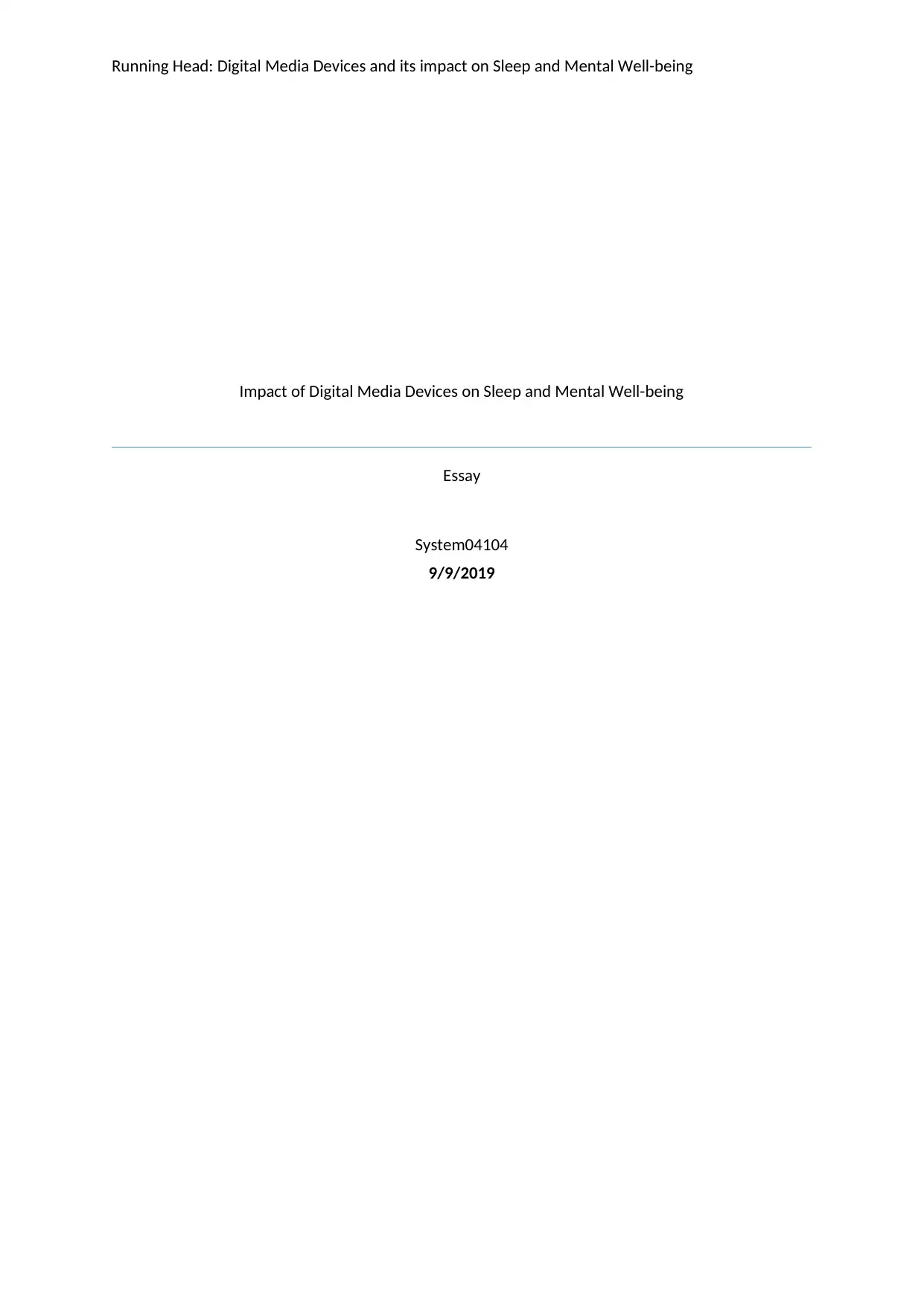
Running Head: Digital Media Devices and its impact on Sleep and Mental Well-being
Impact of Digital Media Devices on Sleep and Mental Well-being
Essay
System04104
9/9/2019
Impact of Digital Media Devices on Sleep and Mental Well-being
Essay
System04104
9/9/2019
Paraphrase This Document
Need a fresh take? Get an instant paraphrase of this document with our AI Paraphraser
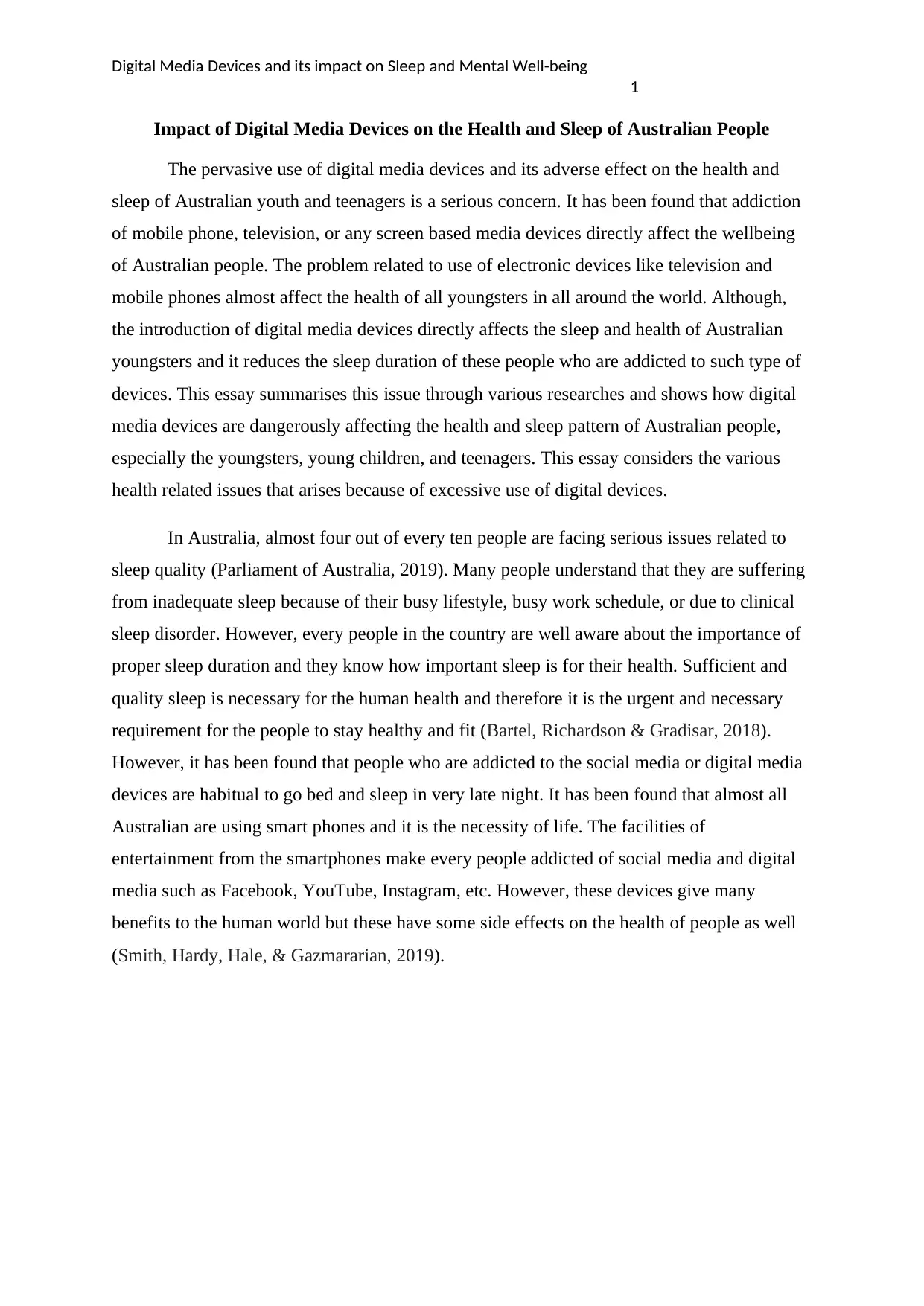
Digital Media Devices and its impact on Sleep and Mental Well-being
1
Impact of Digital Media Devices on the Health and Sleep of Australian People
The pervasive use of digital media devices and its adverse effect on the health and
sleep of Australian youth and teenagers is a serious concern. It has been found that addiction
of mobile phone, television, or any screen based media devices directly affect the wellbeing
of Australian people. The problem related to use of electronic devices like television and
mobile phones almost affect the health of all youngsters in all around the world. Although,
the introduction of digital media devices directly affects the sleep and health of Australian
youngsters and it reduces the sleep duration of these people who are addicted to such type of
devices. This essay summarises this issue through various researches and shows how digital
media devices are dangerously affecting the health and sleep pattern of Australian people,
especially the youngsters, young children, and teenagers. This essay considers the various
health related issues that arises because of excessive use of digital devices.
In Australia, almost four out of every ten people are facing serious issues related to
sleep quality (Parliament of Australia, 2019). Many people understand that they are suffering
from inadequate sleep because of their busy lifestyle, busy work schedule, or due to clinical
sleep disorder. However, every people in the country are well aware about the importance of
proper sleep duration and they know how important sleep is for their health. Sufficient and
quality sleep is necessary for the human health and therefore it is the urgent and necessary
requirement for the people to stay healthy and fit (Bartel, Richardson & Gradisar, 2018).
However, it has been found that people who are addicted to the social media or digital media
devices are habitual to go bed and sleep in very late night. It has been found that almost all
Australian are using smart phones and it is the necessity of life. The facilities of
entertainment from the smartphones make every people addicted of social media and digital
media such as Facebook, YouTube, Instagram, etc. However, these devices give many
benefits to the human world but these have some side effects on the health of people as well
(Smith, Hardy, Hale, & Gazmararian, 2019).
1
Impact of Digital Media Devices on the Health and Sleep of Australian People
The pervasive use of digital media devices and its adverse effect on the health and
sleep of Australian youth and teenagers is a serious concern. It has been found that addiction
of mobile phone, television, or any screen based media devices directly affect the wellbeing
of Australian people. The problem related to use of electronic devices like television and
mobile phones almost affect the health of all youngsters in all around the world. Although,
the introduction of digital media devices directly affects the sleep and health of Australian
youngsters and it reduces the sleep duration of these people who are addicted to such type of
devices. This essay summarises this issue through various researches and shows how digital
media devices are dangerously affecting the health and sleep pattern of Australian people,
especially the youngsters, young children, and teenagers. This essay considers the various
health related issues that arises because of excessive use of digital devices.
In Australia, almost four out of every ten people are facing serious issues related to
sleep quality (Parliament of Australia, 2019). Many people understand that they are suffering
from inadequate sleep because of their busy lifestyle, busy work schedule, or due to clinical
sleep disorder. However, every people in the country are well aware about the importance of
proper sleep duration and they know how important sleep is for their health. Sufficient and
quality sleep is necessary for the human health and therefore it is the urgent and necessary
requirement for the people to stay healthy and fit (Bartel, Richardson & Gradisar, 2018).
However, it has been found that people who are addicted to the social media or digital media
devices are habitual to go bed and sleep in very late night. It has been found that almost all
Australian are using smart phones and it is the necessity of life. The facilities of
entertainment from the smartphones make every people addicted of social media and digital
media such as Facebook, YouTube, Instagram, etc. However, these devices give many
benefits to the human world but these have some side effects on the health of people as well
(Smith, Hardy, Hale, & Gazmararian, 2019).
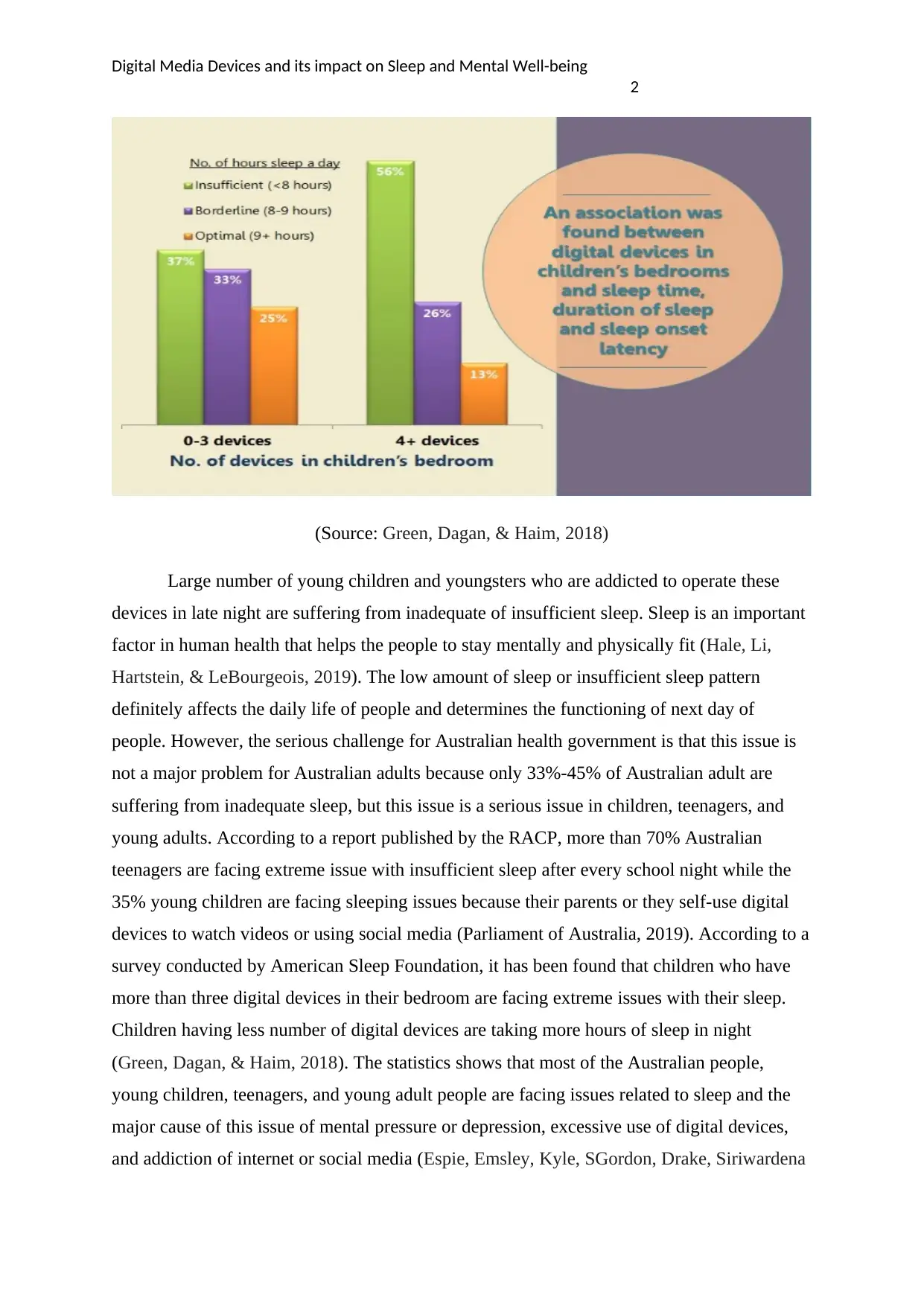
Digital Media Devices and its impact on Sleep and Mental Well-being
2
(Source: Green, Dagan, & Haim, 2018)
Large number of young children and youngsters who are addicted to operate these
devices in late night are suffering from inadequate of insufficient sleep. Sleep is an important
factor in human health that helps the people to stay mentally and physically fit (Hale, Li,
Hartstein, & LeBourgeois, 2019). The low amount of sleep or insufficient sleep pattern
definitely affects the daily life of people and determines the functioning of next day of
people. However, the serious challenge for Australian health government is that this issue is
not a major problem for Australian adults because only 33%-45% of Australian adult are
suffering from inadequate sleep, but this issue is a serious issue in children, teenagers, and
young adults. According to a report published by the RACP, more than 70% Australian
teenagers are facing extreme issue with insufficient sleep after every school night while the
35% young children are facing sleeping issues because their parents or they self-use digital
devices to watch videos or using social media (Parliament of Australia, 2019). According to a
survey conducted by American Sleep Foundation, it has been found that children who have
more than three digital devices in their bedroom are facing extreme issues with their sleep.
Children having less number of digital devices are taking more hours of sleep in night
(Green, Dagan, & Haim, 2018). The statistics shows that most of the Australian people,
young children, teenagers, and young adult people are facing issues related to sleep and the
major cause of this issue of mental pressure or depression, excessive use of digital devices,
and addiction of internet or social media (Espie, Emsley, Kyle, SGordon, Drake, Siriwardena
2
(Source: Green, Dagan, & Haim, 2018)
Large number of young children and youngsters who are addicted to operate these
devices in late night are suffering from inadequate of insufficient sleep. Sleep is an important
factor in human health that helps the people to stay mentally and physically fit (Hale, Li,
Hartstein, & LeBourgeois, 2019). The low amount of sleep or insufficient sleep pattern
definitely affects the daily life of people and determines the functioning of next day of
people. However, the serious challenge for Australian health government is that this issue is
not a major problem for Australian adults because only 33%-45% of Australian adult are
suffering from inadequate sleep, but this issue is a serious issue in children, teenagers, and
young adults. According to a report published by the RACP, more than 70% Australian
teenagers are facing extreme issue with insufficient sleep after every school night while the
35% young children are facing sleeping issues because their parents or they self-use digital
devices to watch videos or using social media (Parliament of Australia, 2019). According to a
survey conducted by American Sleep Foundation, it has been found that children who have
more than three digital devices in their bedroom are facing extreme issues with their sleep.
Children having less number of digital devices are taking more hours of sleep in night
(Green, Dagan, & Haim, 2018). The statistics shows that most of the Australian people,
young children, teenagers, and young adult people are facing issues related to sleep and the
major cause of this issue of mental pressure or depression, excessive use of digital devices,
and addiction of internet or social media (Espie, Emsley, Kyle, SGordon, Drake, Siriwardena
⊘ This is a preview!⊘
Do you want full access?
Subscribe today to unlock all pages.

Trusted by 1+ million students worldwide
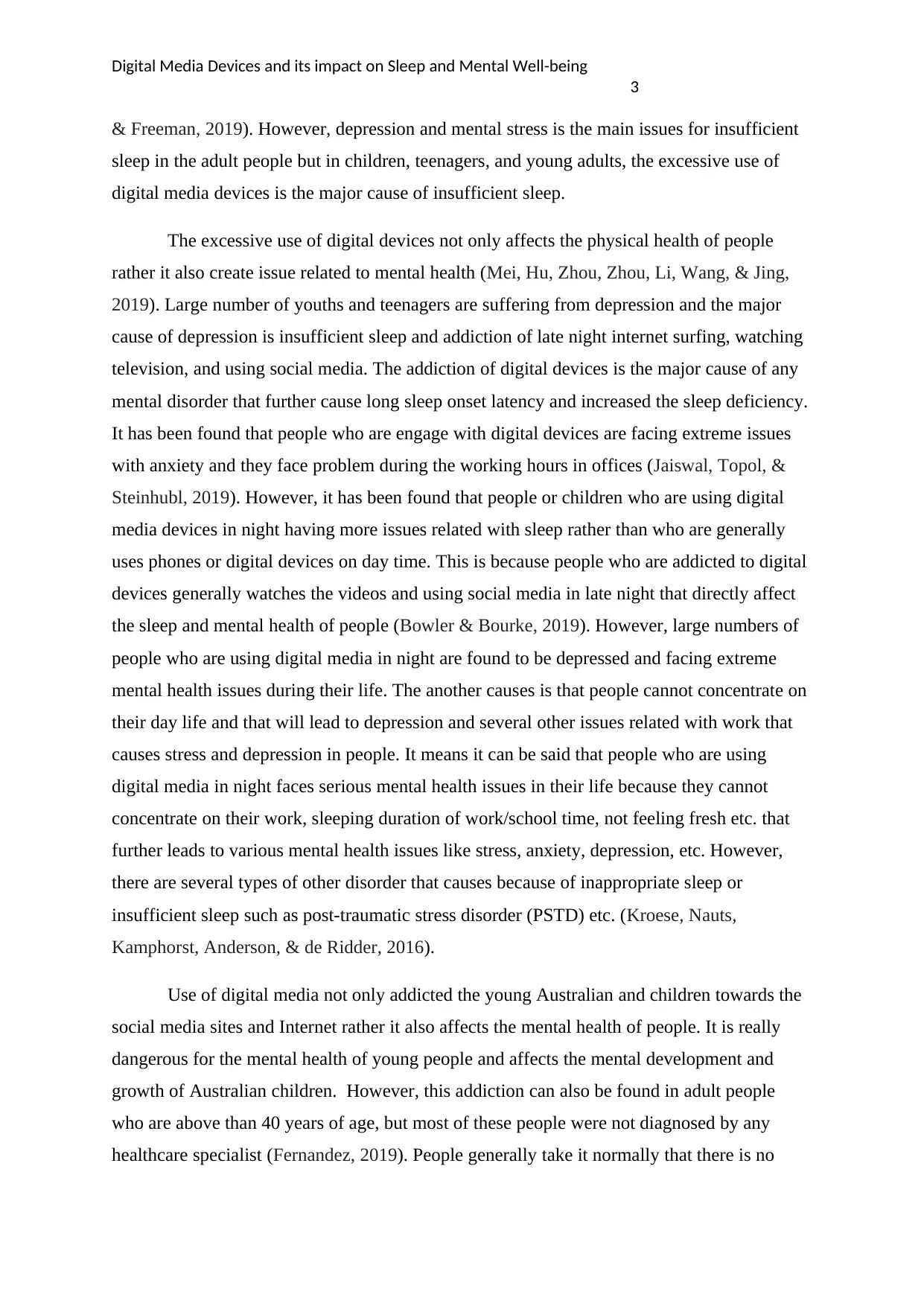
Digital Media Devices and its impact on Sleep and Mental Well-being
3
& Freeman, 2019). However, depression and mental stress is the main issues for insufficient
sleep in the adult people but in children, teenagers, and young adults, the excessive use of
digital media devices is the major cause of insufficient sleep.
The excessive use of digital devices not only affects the physical health of people
rather it also create issue related to mental health (Mei, Hu, Zhou, Zhou, Li, Wang, & Jing,
2019). Large number of youths and teenagers are suffering from depression and the major
cause of depression is insufficient sleep and addiction of late night internet surfing, watching
television, and using social media. The addiction of digital devices is the major cause of any
mental disorder that further cause long sleep onset latency and increased the sleep deficiency.
It has been found that people who are engage with digital devices are facing extreme issues
with anxiety and they face problem during the working hours in offices (Jaiswal, Topol, &
Steinhubl, 2019). However, it has been found that people or children who are using digital
media devices in night having more issues related with sleep rather than who are generally
uses phones or digital devices on day time. This is because people who are addicted to digital
devices generally watches the videos and using social media in late night that directly affect
the sleep and mental health of people (Bowler & Bourke, 2019). However, large numbers of
people who are using digital media in night are found to be depressed and facing extreme
mental health issues during their life. The another causes is that people cannot concentrate on
their day life and that will lead to depression and several other issues related with work that
causes stress and depression in people. It means it can be said that people who are using
digital media in night faces serious mental health issues in their life because they cannot
concentrate on their work, sleeping duration of work/school time, not feeling fresh etc. that
further leads to various mental health issues like stress, anxiety, depression, etc. However,
there are several types of other disorder that causes because of inappropriate sleep or
insufficient sleep such as post-traumatic stress disorder (PSTD) etc. (Kroese, Nauts,
Kamphorst, Anderson, & de Ridder, 2016).
Use of digital media not only addicted the young Australian and children towards the
social media sites and Internet rather it also affects the mental health of people. It is really
dangerous for the mental health of young people and affects the mental development and
growth of Australian children. However, this addiction can also be found in adult people
who are above than 40 years of age, but most of these people were not diagnosed by any
healthcare specialist (Fernandez, 2019). People generally take it normally that there is no
3
& Freeman, 2019). However, depression and mental stress is the main issues for insufficient
sleep in the adult people but in children, teenagers, and young adults, the excessive use of
digital media devices is the major cause of insufficient sleep.
The excessive use of digital devices not only affects the physical health of people
rather it also create issue related to mental health (Mei, Hu, Zhou, Zhou, Li, Wang, & Jing,
2019). Large number of youths and teenagers are suffering from depression and the major
cause of depression is insufficient sleep and addiction of late night internet surfing, watching
television, and using social media. The addiction of digital devices is the major cause of any
mental disorder that further cause long sleep onset latency and increased the sleep deficiency.
It has been found that people who are engage with digital devices are facing extreme issues
with anxiety and they face problem during the working hours in offices (Jaiswal, Topol, &
Steinhubl, 2019). However, it has been found that people or children who are using digital
media devices in night having more issues related with sleep rather than who are generally
uses phones or digital devices on day time. This is because people who are addicted to digital
devices generally watches the videos and using social media in late night that directly affect
the sleep and mental health of people (Bowler & Bourke, 2019). However, large numbers of
people who are using digital media in night are found to be depressed and facing extreme
mental health issues during their life. The another causes is that people cannot concentrate on
their day life and that will lead to depression and several other issues related with work that
causes stress and depression in people. It means it can be said that people who are using
digital media in night faces serious mental health issues in their life because they cannot
concentrate on their work, sleeping duration of work/school time, not feeling fresh etc. that
further leads to various mental health issues like stress, anxiety, depression, etc. However,
there are several types of other disorder that causes because of inappropriate sleep or
insufficient sleep such as post-traumatic stress disorder (PSTD) etc. (Kroese, Nauts,
Kamphorst, Anderson, & de Ridder, 2016).
Use of digital media not only addicted the young Australian and children towards the
social media sites and Internet rather it also affects the mental health of people. It is really
dangerous for the mental health of young people and affects the mental development and
growth of Australian children. However, this addiction can also be found in adult people
who are above than 40 years of age, but most of these people were not diagnosed by any
healthcare specialist (Fernandez, 2019). People generally take it normally that there is no
Paraphrase This Document
Need a fresh take? Get an instant paraphrase of this document with our AI Paraphraser
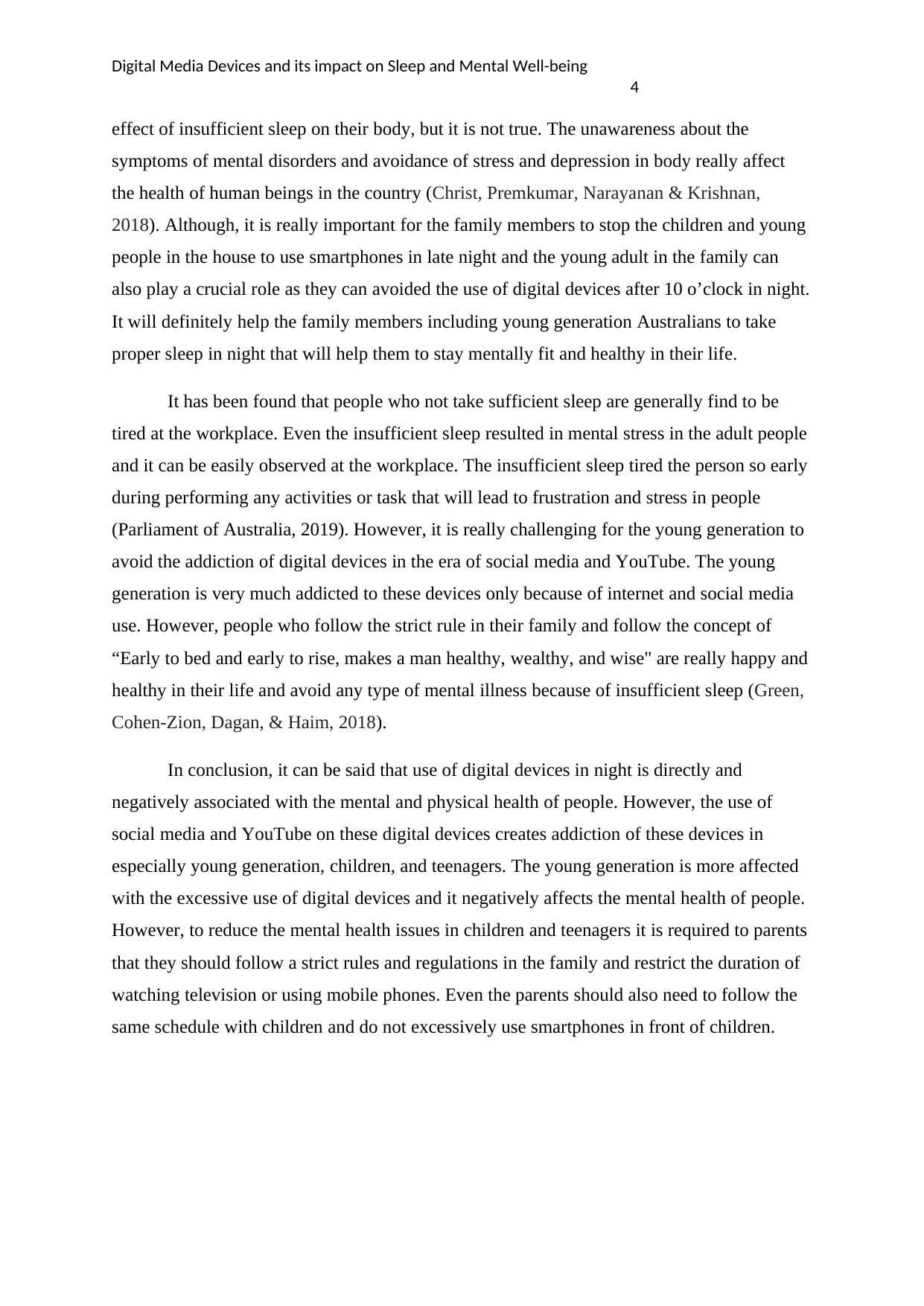
Digital Media Devices and its impact on Sleep and Mental Well-being
4
effect of insufficient sleep on their body, but it is not true. The unawareness about the
symptoms of mental disorders and avoidance of stress and depression in body really affect
the health of human beings in the country (Christ, Premkumar, Narayanan & Krishnan,
2018). Although, it is really important for the family members to stop the children and young
people in the house to use smartphones in late night and the young adult in the family can
also play a crucial role as they can avoided the use of digital devices after 10 o’clock in night.
It will definitely help the family members including young generation Australians to take
proper sleep in night that will help them to stay mentally fit and healthy in their life.
It has been found that people who not take sufficient sleep are generally find to be
tired at the workplace. Even the insufficient sleep resulted in mental stress in the adult people
and it can be easily observed at the workplace. The insufficient sleep tired the person so early
during performing any activities or task that will lead to frustration and stress in people
(Parliament of Australia, 2019). However, it is really challenging for the young generation to
avoid the addiction of digital devices in the era of social media and YouTube. The young
generation is very much addicted to these devices only because of internet and social media
use. However, people who follow the strict rule in their family and follow the concept of
“Early to bed and early to rise, makes a man healthy, wealthy, and wise" are really happy and
healthy in their life and avoid any type of mental illness because of insufficient sleep (Green,
Cohen-Zion, Dagan, & Haim, 2018).
In conclusion, it can be said that use of digital devices in night is directly and
negatively associated with the mental and physical health of people. However, the use of
social media and YouTube on these digital devices creates addiction of these devices in
especially young generation, children, and teenagers. The young generation is more affected
with the excessive use of digital devices and it negatively affects the mental health of people.
However, to reduce the mental health issues in children and teenagers it is required to parents
that they should follow a strict rules and regulations in the family and restrict the duration of
watching television or using mobile phones. Even the parents should also need to follow the
same schedule with children and do not excessively use smartphones in front of children.
4
effect of insufficient sleep on their body, but it is not true. The unawareness about the
symptoms of mental disorders and avoidance of stress and depression in body really affect
the health of human beings in the country (Christ, Premkumar, Narayanan & Krishnan,
2018). Although, it is really important for the family members to stop the children and young
people in the house to use smartphones in late night and the young adult in the family can
also play a crucial role as they can avoided the use of digital devices after 10 o’clock in night.
It will definitely help the family members including young generation Australians to take
proper sleep in night that will help them to stay mentally fit and healthy in their life.
It has been found that people who not take sufficient sleep are generally find to be
tired at the workplace. Even the insufficient sleep resulted in mental stress in the adult people
and it can be easily observed at the workplace. The insufficient sleep tired the person so early
during performing any activities or task that will lead to frustration and stress in people
(Parliament of Australia, 2019). However, it is really challenging for the young generation to
avoid the addiction of digital devices in the era of social media and YouTube. The young
generation is very much addicted to these devices only because of internet and social media
use. However, people who follow the strict rule in their family and follow the concept of
“Early to bed and early to rise, makes a man healthy, wealthy, and wise" are really happy and
healthy in their life and avoid any type of mental illness because of insufficient sleep (Green,
Cohen-Zion, Dagan, & Haim, 2018).
In conclusion, it can be said that use of digital devices in night is directly and
negatively associated with the mental and physical health of people. However, the use of
social media and YouTube on these digital devices creates addiction of these devices in
especially young generation, children, and teenagers. The young generation is more affected
with the excessive use of digital devices and it negatively affects the mental health of people.
However, to reduce the mental health issues in children and teenagers it is required to parents
that they should follow a strict rules and regulations in the family and restrict the duration of
watching television or using mobile phones. Even the parents should also need to follow the
same schedule with children and do not excessively use smartphones in front of children.
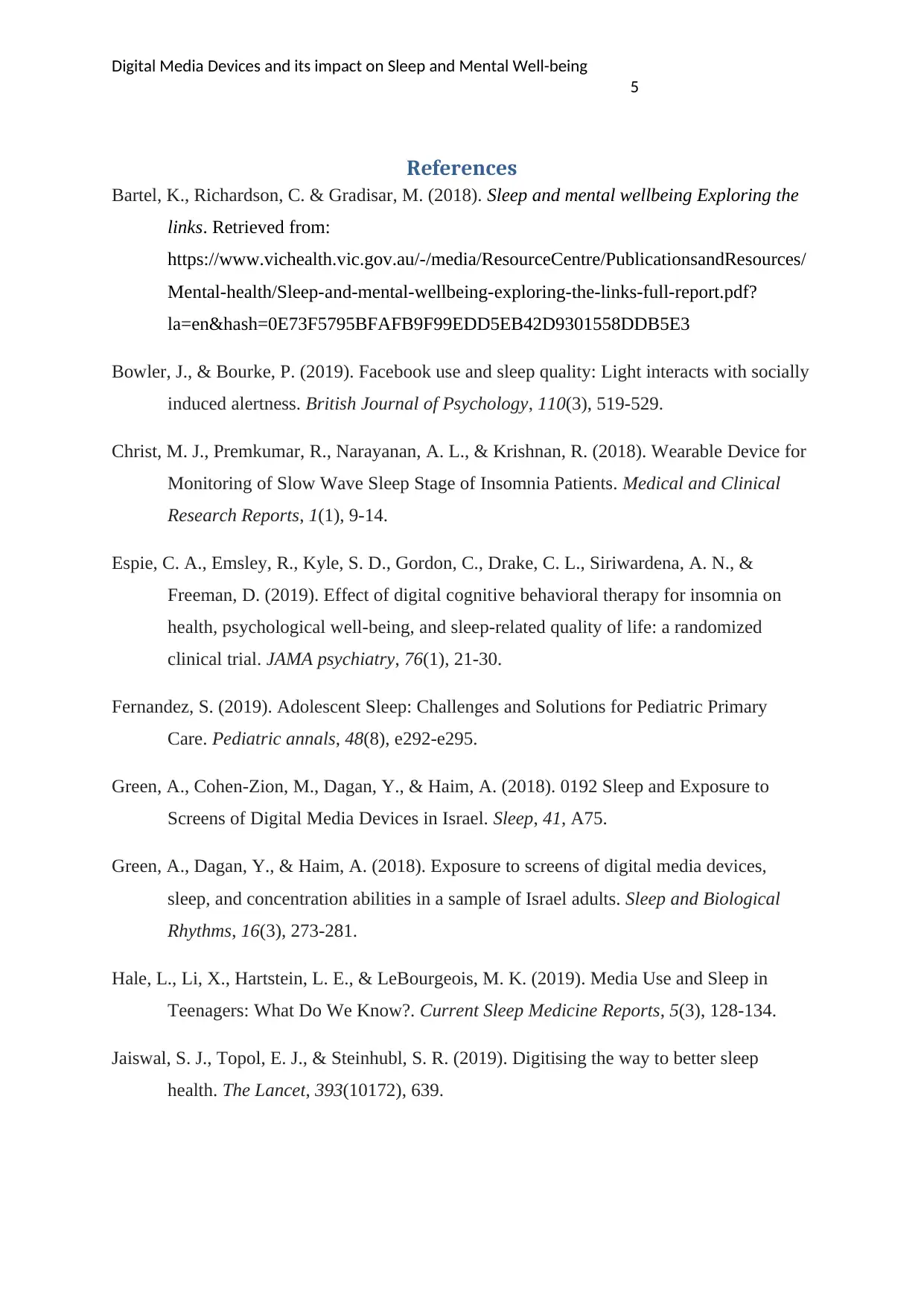
Digital Media Devices and its impact on Sleep and Mental Well-being
5
References
Bartel, K., Richardson, C. & Gradisar, M. (2018). Sleep and mental wellbeing Exploring the
links. Retrieved from:
https://www.vichealth.vic.gov.au/-/media/ResourceCentre/PublicationsandResources/
Mental-health/Sleep-and-mental-wellbeing-exploring-the-links-full-report.pdf?
la=en&hash=0E73F5795BFAFB9F99EDD5EB42D9301558DDB5E3
Bowler, J., & Bourke, P. (2019). Facebook use and sleep quality: Light interacts with socially
induced alertness. British Journal of Psychology, 110(3), 519-529.
Christ, M. J., Premkumar, R., Narayanan, A. L., & Krishnan, R. (2018). Wearable Device for
Monitoring of Slow Wave Sleep Stage of Insomnia Patients. Medical and Clinical
Research Reports, 1(1), 9-14.
Espie, C. A., Emsley, R., Kyle, S. D., Gordon, C., Drake, C. L., Siriwardena, A. N., &
Freeman, D. (2019). Effect of digital cognitive behavioral therapy for insomnia on
health, psychological well-being, and sleep-related quality of life: a randomized
clinical trial. JAMA psychiatry, 76(1), 21-30.
Fernandez, S. (2019). Adolescent Sleep: Challenges and Solutions for Pediatric Primary
Care. Pediatric annals, 48(8), e292-e295.
Green, A., Cohen-Zion, M., Dagan, Y., & Haim, A. (2018). 0192 Sleep and Exposure to
Screens of Digital Media Devices in Israel. Sleep, 41, A75.
Green, A., Dagan, Y., & Haim, A. (2018). Exposure to screens of digital media devices,
sleep, and concentration abilities in a sample of Israel adults. Sleep and Biological
Rhythms, 16(3), 273-281.
Hale, L., Li, X., Hartstein, L. E., & LeBourgeois, M. K. (2019). Media Use and Sleep in
Teenagers: What Do We Know?. Current Sleep Medicine Reports, 5(3), 128-134.
Jaiswal, S. J., Topol, E. J., & Steinhubl, S. R. (2019). Digitising the way to better sleep
health. The Lancet, 393(10172), 639.
5
References
Bartel, K., Richardson, C. & Gradisar, M. (2018). Sleep and mental wellbeing Exploring the
links. Retrieved from:
https://www.vichealth.vic.gov.au/-/media/ResourceCentre/PublicationsandResources/
Mental-health/Sleep-and-mental-wellbeing-exploring-the-links-full-report.pdf?
la=en&hash=0E73F5795BFAFB9F99EDD5EB42D9301558DDB5E3
Bowler, J., & Bourke, P. (2019). Facebook use and sleep quality: Light interacts with socially
induced alertness. British Journal of Psychology, 110(3), 519-529.
Christ, M. J., Premkumar, R., Narayanan, A. L., & Krishnan, R. (2018). Wearable Device for
Monitoring of Slow Wave Sleep Stage of Insomnia Patients. Medical and Clinical
Research Reports, 1(1), 9-14.
Espie, C. A., Emsley, R., Kyle, S. D., Gordon, C., Drake, C. L., Siriwardena, A. N., &
Freeman, D. (2019). Effect of digital cognitive behavioral therapy for insomnia on
health, psychological well-being, and sleep-related quality of life: a randomized
clinical trial. JAMA psychiatry, 76(1), 21-30.
Fernandez, S. (2019). Adolescent Sleep: Challenges and Solutions for Pediatric Primary
Care. Pediatric annals, 48(8), e292-e295.
Green, A., Cohen-Zion, M., Dagan, Y., & Haim, A. (2018). 0192 Sleep and Exposure to
Screens of Digital Media Devices in Israel. Sleep, 41, A75.
Green, A., Dagan, Y., & Haim, A. (2018). Exposure to screens of digital media devices,
sleep, and concentration abilities in a sample of Israel adults. Sleep and Biological
Rhythms, 16(3), 273-281.
Hale, L., Li, X., Hartstein, L. E., & LeBourgeois, M. K. (2019). Media Use and Sleep in
Teenagers: What Do We Know?. Current Sleep Medicine Reports, 5(3), 128-134.
Jaiswal, S. J., Topol, E. J., & Steinhubl, S. R. (2019). Digitising the way to better sleep
health. The Lancet, 393(10172), 639.
⊘ This is a preview!⊘
Do you want full access?
Subscribe today to unlock all pages.

Trusted by 1+ million students worldwide
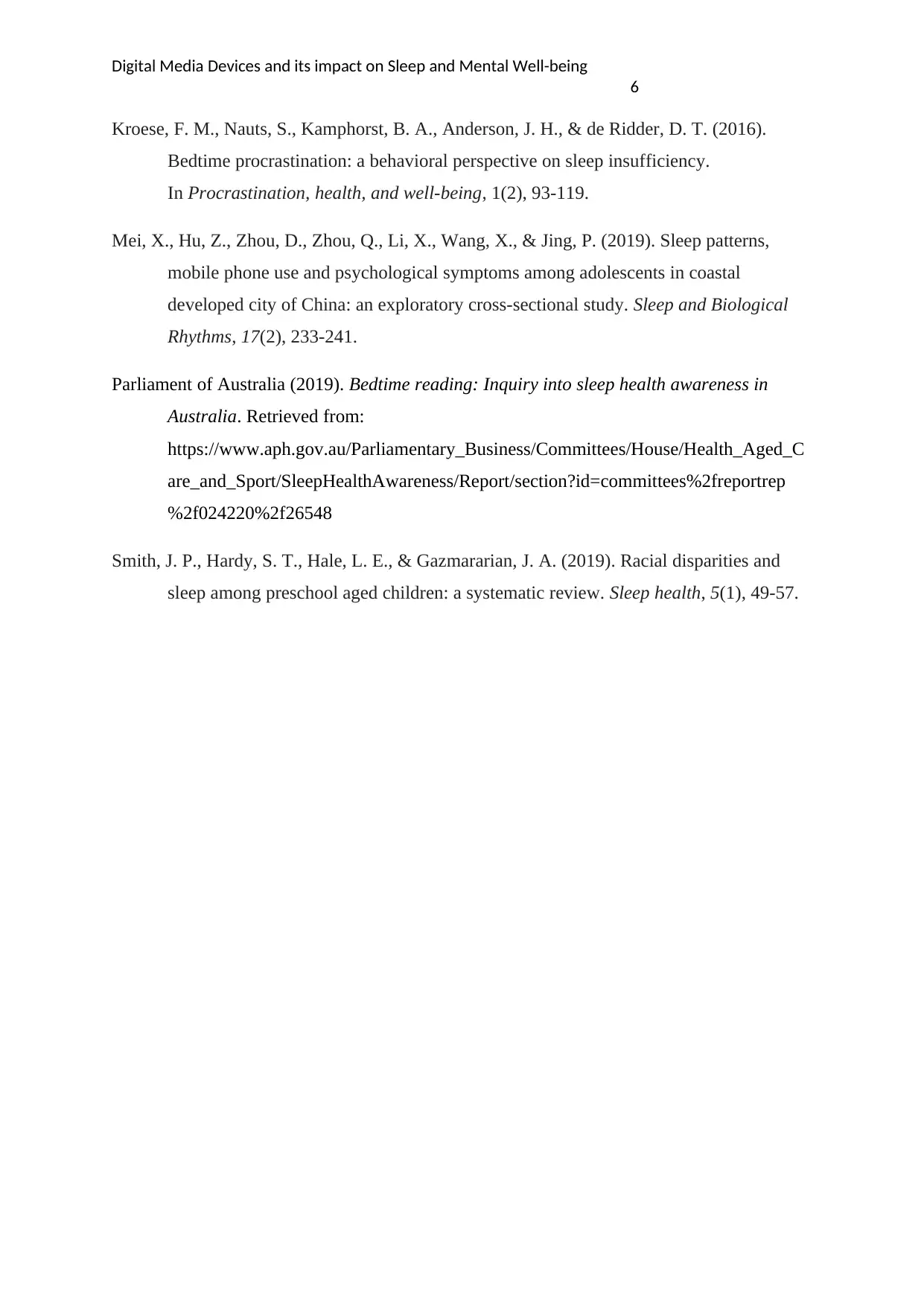
Digital Media Devices and its impact on Sleep and Mental Well-being
6
Kroese, F. M., Nauts, S., Kamphorst, B. A., Anderson, J. H., & de Ridder, D. T. (2016).
Bedtime procrastination: a behavioral perspective on sleep insufficiency.
In Procrastination, health, and well-being, 1(2), 93-119.
Mei, X., Hu, Z., Zhou, D., Zhou, Q., Li, X., Wang, X., & Jing, P. (2019). Sleep patterns,
mobile phone use and psychological symptoms among adolescents in coastal
developed city of China: an exploratory cross-sectional study. Sleep and Biological
Rhythms, 17(2), 233-241.
Parliament of Australia (2019). Bedtime reading: Inquiry into sleep health awareness in
Australia. Retrieved from:
https://www.aph.gov.au/Parliamentary_Business/Committees/House/Health_Aged_C
are_and_Sport/SleepHealthAwareness/Report/section?id=committees%2freportrep
%2f024220%2f26548
Smith, J. P., Hardy, S. T., Hale, L. E., & Gazmararian, J. A. (2019). Racial disparities and
sleep among preschool aged children: a systematic review. Sleep health, 5(1), 49-57.
6
Kroese, F. M., Nauts, S., Kamphorst, B. A., Anderson, J. H., & de Ridder, D. T. (2016).
Bedtime procrastination: a behavioral perspective on sleep insufficiency.
In Procrastination, health, and well-being, 1(2), 93-119.
Mei, X., Hu, Z., Zhou, D., Zhou, Q., Li, X., Wang, X., & Jing, P. (2019). Sleep patterns,
mobile phone use and psychological symptoms among adolescents in coastal
developed city of China: an exploratory cross-sectional study. Sleep and Biological
Rhythms, 17(2), 233-241.
Parliament of Australia (2019). Bedtime reading: Inquiry into sleep health awareness in
Australia. Retrieved from:
https://www.aph.gov.au/Parliamentary_Business/Committees/House/Health_Aged_C
are_and_Sport/SleepHealthAwareness/Report/section?id=committees%2freportrep
%2f024220%2f26548
Smith, J. P., Hardy, S. T., Hale, L. E., & Gazmararian, J. A. (2019). Racial disparities and
sleep among preschool aged children: a systematic review. Sleep health, 5(1), 49-57.
1 out of 7
Your All-in-One AI-Powered Toolkit for Academic Success.
+13062052269
info@desklib.com
Available 24*7 on WhatsApp / Email
![[object Object]](/_next/static/media/star-bottom.7253800d.svg)
Unlock your academic potential
Copyright © 2020–2025 A2Z Services. All Rights Reserved. Developed and managed by ZUCOL.


